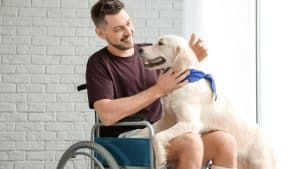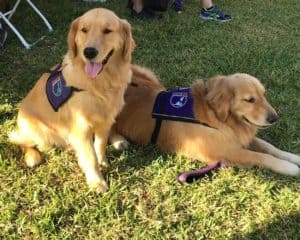Service Dog Train: Everything You Need to Know Before Getting Started
When people search for service dog train resources, they’re usually looking for helpful information on how service dogs are trained, what tasks they can perform, and how they differ from therapy dogs or emotional support animals. Service dogs play a critical role in the daily lives of disabled individuals, offering independence, confidence, and life-changing support.
In this article, we’ll explain the basics of service dog training, what makes a highly trained service dog, and how programs like Genesis Assistance Dogs, Inc. help transform lives.
What Is a Service Dog?
 A service dog is a working dog that has been individually trained to perform specific tasks directly related to a person’s disability. Unlike pets or even emotional support animals, service dogs are recognized under the Americans with Disabilities Act (ADA) and the Air Carrier Access Act, which means they are legally allowed in public spaces, commercial facilities, and even on air travel with their handler.
A service dog is a working dog that has been individually trained to perform specific tasks directly related to a person’s disability. Unlike pets or even emotional support animals, service dogs are recognized under the Americans with Disabilities Act (ADA) and the Air Carrier Access Act, which means they are legally allowed in public spaces, commercial facilities, and even on air travel with their handler.
Examples of tasks a service dog can be trained to perform include:
- Retrieving dropped items like keys or phones.
- Providing mobility assistance or physical assistance such as opening doors.
- Alerting their handler to an impending anxiety attack or episode of post traumatic stress disorder (PTSD).
- Helping with major life activities, from guiding the visually impaired to assisting with balance or medical alerts.
Service Dog Train: What Does It Involve?
Service dog training is an extensive process that goes far beyond basic obedience training. Dogs must master foundation skills before advancing to specialized tasks. A professional service dog trainer or training program ensures the dog is trained to perform specific jobs that help meet a person’s disability needs.
Training typically includes:
- Puppy socialization to adapt to different environments.
- Obedience training for reliability in public access.
- Advanced training skills to help the handler with specific tasks like retrieve objects or provide comfort during medical events.
- Exposure to public spaces such as airports, restaurants, and local governments facilities where the dog is trained to stay calm and focused.
This level of training requires extensive training, sometimes 18–24 months, before a service dog candidate becomes a trained service dog.
Types of Service Dogs
Not all service dogs serve the same purpose. Different breeds and training focus on different tasks:
- Guide dogs: Specially trained for the visually impaired.
- Mobility assistance dogs: Help with balance, retrieving items, or opening doors.
- PTSD service dogs: Provide grounding during flashbacks or panic attacks.
- Facility dogs: Work in nursing homes, hospitals, or commercial facilities to provide comfort and support.
- Therapy dogs vs. emotional support dog: These dogs provide comfort but are not recognized as service animals because their support comes from their dog’s mere presence, not from being trained to perform specific tasks.
Common breeds used as service dogs include Labrador Retrievers and Golden Retrievers because of their intelligence, temperament, and ability to be highly trained.
Can You Train Your Own Service Dog?
Many people wonder if they can train their own dog to become a certified service dog. While it is possible to train your own service dog, success depends on the dog’s temperament, ability to focus, and willingness to learn. Not all dogs can become service dog candidates, which is why professional programs are often recommended.
Organizations like Assistance Dogs International and Canine Companions provide guidelines and standards for training. Choosing the right program ensures you receive accurate, helpful information and make an informed decision.
Why Service Dogs Are Life-Changing
For many owners, having a highly trained service dog means more than just assistance with daily tasks—it means independence. These dogs provide not only physical support but also emotional strength, enabling people to live fuller, more independent lives.
Whether they perform work like opening doors, helping with mobility assistance, or alerting during a medical episode, these dogs are more than pets—they are true partners in navigating life.
About Genesis Assistance Dogs, Inc.
 At Genesis Assistance Dogs, Inc., we believe in the power of assistance dogs to transform lives.
At Genesis Assistance Dogs, Inc., we believe in the power of assistance dogs to transform lives.
Our mission: To provide ability and independence to transform the lives of people with disabilities, through the training and placement of highly skilled assistance dogs in Florida for children and adults.
Our vision: For people with disabilities to realize their full potential through the dedication, service, and companionship of a highly skilled assistance dog.
📞 Contact us: (561) 329-0277
📧 Email: info@genesisassistancedogsinc.org
Frequently Asked Questions (FAQ)
1. What’s the difference between a service dog and an emotional support dog?
A service dog is individually trained to perform specific tasks that directly help with a disability. An emotional support dog provides comfort through their presence but does not require extensive training.
2. How long does it take to train a service dog?
Training usually takes 18–24 months, depending on the tasks required. The dog must undergo both obedience training and specialized task training.
3. Can any dog become a service dog candidate?
Not every puppy or own dog qualifies. Dogs need the right temperament, focus, and ability to be highly trained to handle public access and perform work reliably.
4. Are miniature horses really service animals?
Yes. Under the ADA, miniature horses can also be recognized as service animals if they are individually trained to help with major life activities.
5. Do service dogs need to wear vests?
No, the ADA does not require service dogs to wear vests, though many handlers choose to use them for visibility and to avoid confusion in public spaces.
👉 If you’re considering working with a service dog train program or want to learn more about how a highly trained service dog can transform lives, reach out to Genesis Assistance Dogs, Inc. today.

